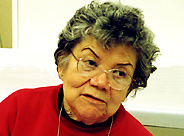
The Pribilof island of St. Paul lost an important elder this month. Mary Nicolai Bourdukofsky passed away on June 2 at age 90. Bourdukofsky was devoted to preserving Unangan culture and history.
Mary Nicolai Bourdukofsky was born January 9, 1923 to Nicolai and Olga Kozloff, on St. Paul Island.
Bourdukofsky was a fixture in many regional Native organizations throughout her life, and even traveled to the Smithsonian Institution in Washington, D.C. to consult on the museum’s Alaska Native collections.
But her close family friend, Sharon Svarny-Livingston, says some parts of Unangan history were hard for Bourdukofsky to share.
“One of the things that she was always really adamant about remembering, even though she didn’t like to talk about it, was the internment during World War II.”
Bourdukofsky was pregnant and already had two small children when St. Paul was evacuated in 1942. She and other Pribilof Island residents were taken to Funter Bay, in southeast Alaska.
The conditions at the camp there were horrendous. Even though it was painful to discuss, Bourdukofsky didn’t want it to be forgotten. So she allowed herself to be interviewed for “Aleut Story,” a 2005 documentary about the Aleut internment.
As Bourdukofsky describes in this clip from “Aleut Story,” she and other Unangan women decided to lobby the government for better treatment:
“So we all got together and had a meeting and then we wrote this letter. I’ll read it: ‘We, the people of this place, want some better place than this to live. This place is no place for living creatures. We drink impure water and then get sick. The children get skin disease — even the grown-ups … Why [do] they not take us to a better place to live and work for ourselves? Do we have to see our children suffer? We all have rights to speak for ourselves.'”
After the war, Bourdukofsky returned to St. Paul to raise her family. She had seven children of her own. But she taught dozens more, at Unangan culture and science camps throughout the state.
Her friend, Svarny-Livingston, worked with her at Unalaska’s Camp Qungaayux. She says Bourdukofsky’s skills seemed to go on forever.
“Basketry, dance, song, language. I mean, she was — she knew everything. You could ask her to teach something, and she would know how to teach it.”
Bourdukofsky was a patient and engaging instructor, and she returned to many camps year after year to teach. But she had a special link to the children of St. Paul, her home village.
She taught at a marine stewardship camp in St. Paul a few years back. Before she left, her young students gave her a nickname in Unangam Tunuu.
“And they called her ‘Stuparam Anaadaa,’ which means ‘mending mother.’ It was probably given to her by them because of all the crafts she taught them — with the sewing, and the seal gut, and the fur seals. But I think it came to mean to everybody else that she kind of was the mending mother of the culture. She helped bring things back. She helped keep things going, so that it would outlive all of the elders and be passed down to the other generations.”
Bourdukofsky was laid to rest in St. Paul on Saturday. She is survived by four sons and her sister, Justina Gilmore.
